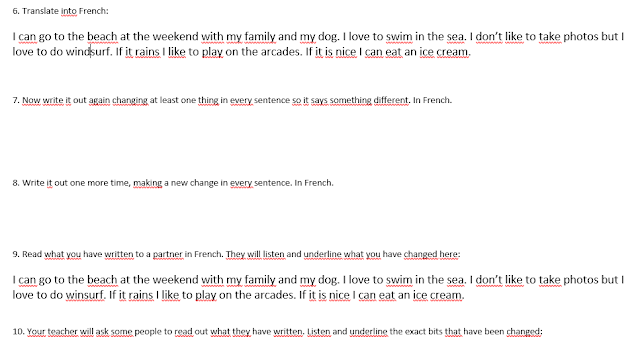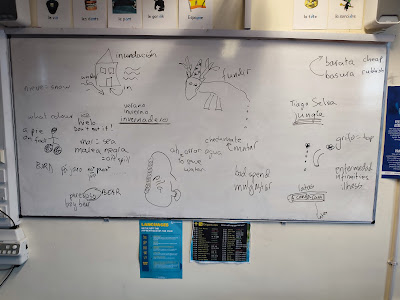The exam boards' draft GCSEs they have been working on are out. And I am not going to be commenting on them while they go through the next stage of approval. Apart from to hope that the generally warm initial reception from teachers is taken as a positive. And a little reminder that the flaws in previous GCSEs (Controlled Assessment, target language prompts in Role Plays...) were introduced by the DfE, not the exam boards. The exam boards have the job of coming up with something that meets the stipulations they are given, works for teachers as a course, and works as an exam.
So I am going to try to tear myself back to what I was thinking about last weekend but didn't have the time to write about: Can I get my brain around the rationale for a syllabus based on High Frequency Language as driven by NCELP and OFSTED?
Hopefully since it started in March 2021, one aspect of this blog is an honest and frank attempt to deal fairly with the ideas we are being asked to adopt. And in many cases I am worried more by the unbalanced pushing of ideas to one extreme, rather than against the ideas themselves. I go along with most of the ideas, but I don't go all the way. And I have made tweaks, for example in making grammar more explicit in our booklets, which as a department we are now evaluating. But one thing I haven't posted about, because I just can't get my head around it, is the High Frequency vocabulary approach.
I can only see the clashes and downsides. I will list them and then see if in the process of writing this, I can start to glimpse why there might be a positive side.
1. Is the High Frequency Approach compatible with the Synthetic Grammar Approach?
NCELP and OFSTED are advocating a focus on learning the language as a grammatical system. Explicit and well-sequenced knowledge building up a picture of the linguistic structures. This includes things like deliberately selecting the words to be taught because they exemplify a pattern (grammar or phonics feature). And excluding other words that would distract from the pattern. Yet we know that the most high frequency language is the most highly irregular. Words which are in everyday use get the corners bashed off. Words which are mostly in the cupboard or even still in their box are in pristine condition.
Here are the most common 100 words in French. They don't fit well with an approach wanting to start with simple clear building blocks. Words like le, en, de, son need a lot of unpacking!
So logically, what words would go best with an approach based on a synthetic language approach, starting from little regular building blocks that can introduce one thing at a time for pupils to deal with? Logically perhaps it would be cognates. There are youtube videos which announce you can learn thousands of Spanish words in minutes. For example by replacing the ty on the end of university to make it into universidad, or opportunity into oportunidad. This approach would seem to be the natural bedfellow of a "one step at a time follow the pattern" syllabus.
If it is true that the syllabus specified the grammar of jouer au foot, jouer du piano but the High Frequency Vocabulary didn't have any sports or instruments, then that's where this should have had a good look at itself and stopped under the weight of its own internal contradictions. But perhaps that story is a myth.
2. Is the Synthetic Grammar Approach compatible with the High Frequency Approach?
That might seem like the same question, but in a recent video Scott Thornbury turned the argument on its head. The High Frequency Language is taken from analysis of corpora of language as used by speakers. What if the study of collocation of words in corpora shows that language is not actually built grammatically at all? Grammar is secondary to idiom. This is the nature of language. Words go together in chunks. If you take the logic of grammar + vocabulary, you end up saying things that are just not said. Examples? Until McDonalds deliberately subverted it, you couldn't use the verb "to love" in the present continuous. The answer to "Who is there?" in French is, "It's me", in Spanish is, "I am me", in English is "It is I" (because the verb to be takes a predicate not an object) but everyone says, "It is me". The grammar is the same in all three languages. But it's not the grammar that determines what you say. The Synthetic Grammar approach is undone by the findings of corpus analysis. It's not how language works at all.
3. Is the High Frequency Approach compatible with Communication?
The "benefit" of a High Frequency vocabulary approach is supposed to be that it pushes us away from lists of random nouns that we've fallen into in order to teach our pupils the plethora of random trivial stuff they might want to say. That it breaks the hold of topics whereby the syllabus is structured by teaching pupils to say things without regard to careful sequencing of the grammar. This is clearly an example of what I mentioned above of an idea which has been pushed too far. Of course I agree that learning should not be a series of "learn to say this and then move on" episodes. It felt a bit like that in the mid 90s, but even then I am sure it was more thought-through than that. But if teaching Pets is to be replaced with teaching nouns you can have which exemplify regular masculine and feminine endings... And we are happy to teach red dog, red tortoise (but not green dog, green tortoise because that requires adjectival agreement and we only teach one thing at a time)... then you can't ask the question, "What pets do you have?" You can only say, "What regular masculine or feminine nouns qualified by an invariable adjective do you have?" So communication has gone out of the window. The corpus approach, together with the synthetic grammar approach has, in a glorious self fulfillment of the word "corpus", led to a dead body of language. A zombie language which is studied for form, not for pupils to create meaning. And of course this reminds us there are dead languages too, which this approach is all in favour of more pupils studying. Precisely because it is an intellectual exercise unsullied by actual foreigners who communicate in the language in their unpredictable idiomatic ways.
4. Is the High Frequency approach compatible with Social Justice?
And if communication has gone out of the window, then so has social justice. Because if mother is High Frequency, but step mother isn't, if Christian is on the list but other religions aren't, if Spain is on the list but Puerto Rico isn't... then this isn't about a plethora of trivia. It's about pupils' lives. Of course the answer then is, "They are not learning to talk about things: They are learning the language." So communication has to go. Because as soon as this hits the real classroom, pupils want to learn to say things. So any High Frequency Vocabulary approach has to be immediately qualified by, "Oh, yes, of course if they ask you can teach them things." Which is an admission of its failure. Yes to: "We need to make sure we address the balance and make sure we teach more of the grammar and more of the High Frequency Words." But No to: "We should build the syllabus out of High Frequency Words."
5. The High Frequency approach WOULD be compatible with authentic materials.
One area where a High Frequency Vocabulary approach would be useful would be if pupils were learning through reading or listening to lots of rich authentic materials. So a syllabus based on a secure knowledge of non topic words, word classes other than nouns, words which have more of a role in sentence building than in their own meaning, words with a core meaning but multiple other uses (such as "de"). The words which make up the majority of most texts, as NCELP often say. This would make so much sense if our pupils were exposed to a diet of books, stories, non fiction, documentaries. The texts would be a good and natural source of the high frequency words. And the high frequency words would be the key to understanding the texts and not just guessing at meaning from cognates and topic words. BUT, the OFSTED approach is that we should be very cautious with authentic or even modified texts. Pupils should be exposed to texts which are artificially (synthetically) created to model and rehearse the language and grammar patterns pupils are learning. They want us to believe pupils read by parsing known grammar and vocabulary to arrive at meaning. So again, the High Frequency Vocabulary approach is incompatible with other aspects of this project.
There are other arguments too. In the US, teachers fight against the idea that there exists Plato's ideal form of the language. For them, the classroom is a communicative space. And the language in that classroom is valid language. Their pupils are emerging speakers of a language, transitioning from monolingual to bilingual. And the language that matters is the developing language of their pupils. They approach this from a social justice perspective, resisting the idea of an imperialist "correct version" of the language. But going back to his video, Scott Thornbury resists it from a linguistic perspective. Having already pointed out that corpus analysis shows that language does not equal grammar + vocabulary, he goes on to say that language learning does not happen by breaking down the linguist's language in to what seem like logical chunks of grammar and predetermined vocabulary. The pupils' language is grown out of an accumulation things they are learning to understand and say. Which is not the same as a breakdown of the overall grammar.
You must watch the video for his omelette metaphor.
This is all good fun and I enjoy thinking about it. Even if I couldn't get anywhere near finding an acceptable rationale for structuring the curriculum around High Frequency Vocabulary. But what really counts is what happens in the classroom. Day in day out, we find our pupils want to communicate. They want to know how to say things. Often personal, sometimes bizarre, maybe cultural. Sometimes which fit in with what they can say, sometimes which just have to be learned as a chunk. And we wouldn't want to remove that element of language learning. For the pupils to be focused on what they can say and what they want to be able to say, is a good thing. The teacher has a vision of how their language is going to accumulate and be conceptualised. And may increasingly share that with the pupils. But when you get in the classroom, meaning and communication come first. Watch Scott Thornbury's omelette video and it will become clear why. You don't make an omelette by chopping up the body of a dead omelette.
So, is the NCELP-OFSTED explicit knowledge about language curriculum a logical clearly thought-through solution? Or is it a mishmash of political fads and individuals' personal preferences in a barely coherent project? The role of High Frequency Language, incompatible with so many of their other approaches suggests it may not be as rigorous as they would like to pretend.


























